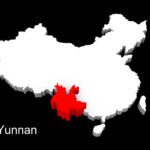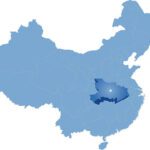Families are the basic unit of society, and their well-being is essential for the overall development of a community or a nation. This technical report provides an overview of family life in the Chinese province of Guizhou. This report is written for stakeholders with an interest in family life in China, specifically in the province of Guizhou.
The report’s main objective is to provide a concise overview of the conditional state of families using Guizhou family demographic statistics (e.g., number of families, family structure, racial and ethnic diversity, marriage rates, divorce rates, family income, etc.).
Data for this report was obtained using open-sourced information, such as the National Bureau of Statistics of China. This methodological approach makes certain that the report’s findings are transparent and replicable, and stakeholders can access, verify, and utilize the data sources themselves.
Overview
Guizhou is a landlocked province in the southwest region of the People’s Republic of China. Its capital and largest city is Guiyang, in the center of the province. Guizhou borders the autonomous region of Guangxi to the south, Yunnan to the west, Sichuan to the northwest, the municipality of Chongqing to the north, and Hunan to the east.
Guizhou is a mountainous province, with higher altitudes in the west and center. It lies at the eastern end of the Yungui Plateau. Demographically, it is one of China’s most diverse provinces. Minority groups account for 36.44% of the total population, with a 1.14 percent annual average growth rate, according to the province’s 2020 Guizhou statistical yearbook.
Guizhou is a major producer of agricultural products, including rice, corn, tobacco, and tea. The province is also home to a number of important mineral deposits, including copper, lead, zinc, and coal. In recent years, Guizhou has become a major center for the development of the internet and information technology.
Some of the most popular tourist destinations in Guizhou include:
- Huangguoshu Waterfall, the tallest waterfall in China
- Dragon Palace Cave, an extensive underground system with waterways
- Zhijin Cave, a vast cavern with karst formations
- Qingyan Fortress, a 14th-century fortress and town
- Longsheng Rice Terraces, a UNESCO World Heritage Site
- Kaili, a city known for its Miao and Dong minority cultures
Guizhou is a beautiful and diverse province with a rich history and culture. It is a great place to visit for those who are interested in learning about China’s ethnic minorities, its natural beauty, or its growing technological sector.
Additional facts about Guizhou:
- The name “Guizhou” means “precious land” in Chinese.
- The capital of Guizhou, Guiyang, is known as the “City of Eternal Spring” due to its mild climate.
- Guizhou is home to the world’s largest karst cave system, the Zhijin Cave.
- The Longsheng Rice Terraces in Guizhou are one of the most spectacular natural wonders in China.
- Guizhou is a major producer of tea, tobacco, and copper.
- The internet and information technology sectors are growing rapidly in Guizhou.
Demographics and Ethnic Diversity
According to the 2022 Guizhou statistical yearbook, Guizhou has a population of 38,562,148 people, with the majority belonging to the Han (24,511,882) ethnic group in the seventh province population census. Although the Han comprise 63.56% of the total population in Guizhou, Guizhou has significant ethnic diversity. It is home to several minority groups, including the Mangolian, Hui, Miao (Hmong), Yi, Zhuang, Buyi, Manchu, Dong, Yao, Bai, She, Shui, Mulam, Qiang, Maonan, Gelao, and many others, each with their own distinct traditions and practices related to family life and social structures.
Family Structures and Traditions
Traditional family structures in Guizhou are often influenced by Confucian values, which emphasize the importance of filial piety, respect for elders, and strong family ties. However, the presence of various ethnic groups leads to a diversity of family structures and practices. Some minority communities, like the Miao and Dong, have matrilineal traditions, while others, such as the Buyi and Yi, may follow patrilineal systems.
Marriage and Divorce Rate
According to the 2022 Guizhou Statistical Year Book, a total of 895,198 people were married in 2021, with 445,712 of those being first marriages. According to the same source, the 2021 divorce rate in Guizhou Province was 3.8 per 1,000 people.
Cultural Heritage
Guizhou is renowned for its rich cultural heritage. Traditional festivals, rituals, and ceremonies play significant roles in family life, passing down values and traditions through generations. Guizhou is famous for its stunning natural scenes, such as its underground caves, limestone peaks, sinkholes, roky gorges, and famous waterfalls (e.g., Huangguoshu Waterfall), which has made it one of the most popular travel destinations in China. The Karst landscape in Guizhou is part of UNESCO’s world heritage. Its pristine beauty and ethnic culture attract many tourists around the world.
Socioeconomic Status and Family Well-being
Guizhou is considered one of China’s less developed provinces, with its economy mainly relying on agriculture, mining, and manufacturing industries. Socioeconomic factors influence family well-being, access to education, healthcare, and other social services. Low socioeconomic status was correlated with metabolic syndrome risk among Guizhou residents. Less-developed rural regions may delay early child development, especially among deprived children. Adolescents in rural areas have a higher risk of mental health issues compared to urban adolescents.
Education and Family Dynamics
Education plays a vital role in shaping family dynamics in Guizhou. The Guizhou government has made considerable progress in building up the education system in recent years. There were 30,500 schools with 1,069.49 students at all levels in 2012. Higher education in Guizhou, such as Guizhou Normal University and Guizhou University, provides education opportunities to diverse students nationwide. Additionally, the illiteracy rate has dropped from 42.11% to 6.68% from 1982 to 2020. Specifically, there were around 109,52 people per 100,000 who have college or higher levels of education. Understanding the interplay between traditional values, modern education, and career opportunities can shed light on how families navigate their roles and aspirations for their children.
Urbanization and Migration
In recent years, Guizhou has experienced rapid urbanization and migration, with many people moving from rural areas to cities in search of better opportunities. A reporter in China Daily commented that “a huge number of rural workers have migrated to urban areas, contributing to China’s fast-paced economic development and urbanization.” Data from the Guizhou Statistical Yearbook shows that the urban population increased to around 20,495,900 in 2020 from 10,991,000 in 1953. The urban population will be 53.15% in 2020. This transition can have a significant impact on family relationships, roles, and support systems, which may result in more and more children becoming left-behind children as their parents work outside to become migrant workers.
Conclusion
Guizhou is a landlocked province in the southwest of China. Guiyang, in the middle of the province, is the capital and biggest city. With 38.5 million people, Guizhou is the 18th most populous province in China. In the west and center of Guizhou, there are mountains. The province has one of the most diverse populations in China. More than 37% of the people are from a minority group. Guizhou is a beautiful and varied place with a long and interesting history and culture and much cultural diversity. Each of these groups has its own family and social traditions.
Guizhou is one of the poorer provinces in China but has become a center for the development of the internet and IT more recently. However, it continues to depend on farming, mining, and making things. Guizhou has seen a lot of urbanization and migration, with many people moving from the countryside to the cities to find better jobs. This can change roles, relationships, and support in the family.
Family scientists may look at how socioeconomic factors affect the health and happiness of families, as well as education, health care, and other social services. Education is very important for the way families work in Guizhou. Families can better understand their roles and goals for their children if they know how traditional values, modern education, and job opportunities all work together.





